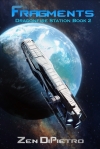
The story of Issk’ath continues in Cradle of the Deep. What? You thought that the series was about the people aboard the Keseberg? ‘Fraid not. It was always about Issk’ath and its interaction with humanity, or at least the humanity that’s left. Issk’ath deals with guilt, called iterations in the narrative. Each time it does something that could be seen as inhumane, Issk’ath iterates. The parallel with humanity is not wasted here. Some people are wracked with guilt for minor infractions. Inter-generational guilt is a common theme in literature. But at times, Issk’ath is immune from its guilt – we’ve all encountered someone whose agenda precludes all other feelings, including guilt. But what is the nature of guilt, and by extension humanity? If a machine can feel guilt, then what is it about humanity that sets it apart from machine or even our genetic ancestors?
Like Traveler in the Dark, Cradle of the Deep focuses on a small cast of characters. Prior to this story, Issk’ath moves from permissive to overt action to “save” humanity from their frail casings. This causes much iteration, and sets us up for the crew of the Dolan to discover the Keseberg adrift with all souls lost at the hands (pincers?) of a homicidal robot. Can someone dying say no to termination under the claim of humane action? Can an otherwise able-bodied person choose to end their life for convenience?
The odd naming structure that baffled me in book one is gone from book two. It’s much easier to understand who is talking to whom in this story. Themes of predestination, choice, and rebellion are rife in this installment of Ex Situ. The narrative did suffer a little bit in this book, with some omnipotent head-hopping. I was able to follow who was doing/thinking what, but at least once or twice, I had to reread a paragraph when I got lost. The story was a fun read, and the ending worked well setting up book three without short-changing the reader. I’d give Cradle of the Deep four stars.













